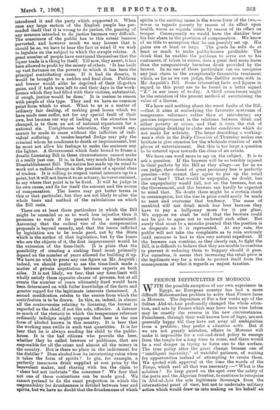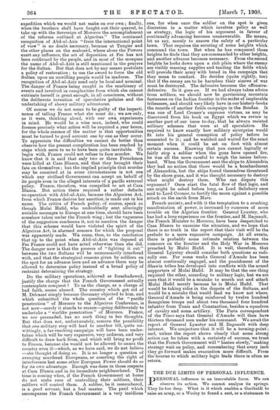FRENCH DIFFICULTIES IN MOROCCO.
WITH the possible exception of our own experience in Egypt, no European country has had a more difficult Mohammedan problem to solve than France faces in Morocco. The deposition at Fez a few weeks ago of the Sultan Abd-ul-Aziz profoundly changed the whole situa- tion, and acts by France which may have been wise before may be exactly the reverse in the new circumstances. Frenchmen, through their well-known love of logic, are not generally happy till they have cut away all ambiguities from a problem ; they prefer a situation nette. But if we are not greatly mistaken, affairs in Morocco will make it impossible for a cut-and-dried policy to emerge from the tangle for a long time to come, and there would be a real danger in trying to force one to the surface. The true policy after the great change became one of " intelligent inactivity," of watchful patience, of waiting for opportunities instead of attempting to create them. We quoted with approval at the time the words of the Temps, which said all that was necessary :—" What is the solution ? To keep guard on the spot over the safety of the ports and the Algerian frontier, to continue to recognise in Abd-ul-Aziz the sole legitimate Sovereign from the international point of view, but not to undertake military action which would draw us into making on his behalf an expedition which we would not make on our own ; finally, when the brothers shall have fought out their quarrel, to take up with the Sovereign of Morocco the accomplishment of the reforms outlined. at Algeciras." The continued. recognition of Abd-ul-Aziz " from the international point of view" is no doubt necessary, because at Tangier and the other places on the seaboard, where alone the Powers exert any influence, the act of deposition at Fez has not been confirmed by the people, and in most of the mosques the name of Abd-ul-Aziz is still mentioned in the prayers for the Sultan. But that does not by any means postulate a policy of restoration ; to use the sword to force the old. Sultan upon an unwilling people would be madness. The recognition of Abd-ul-Aziz need only be local and nominal. The danger of France being caught in the machinery of events and involved in complexities from which she cannot extricate herself is great enough, in all conscience, without the deliberate invention of speculative policies and the undertaking of showy military adventures.
Of course we do not mean to be guilty of the imperti- nence of telling France what she must do ; we are only, as it were, thinking aloud, with our own experiences in mind. He would be a wise man, indeed, who could foresee precisely what action will be required a year hence, for the whole essence of the matter is that opportunities must be turned to good account one by one as they occur. To appreciate the difficulties we cannot do better than observe how the present complication has been reached by steps which seem to us to have been quite inevitable. To begin with, France could not refuse to face murder. We know that it is said that only two or three Frenchmen were killed at Casa Blanca, and that they brought their fate on themselves ; but the implied principle that murder may be connived at in some circumstances is not one -which any civilised Government can accept on behalf of its people even in the alleged interests of a pacific external policy. France, therefore, was compelled. to act at Casa, Blanca. But action there required a rather definite co-operation with Abd-ul-Aziz, because the Algeciras Act, from which France derives her sanction, is made out in his name. The critics of French policy, of course, speak as though Mulai Hafid, who undoubtedly sent alluringly amiable messages to Europe at one time, should have been somehow taken under the French wing ; but the vagueness of the suggestion condemns it, not to mention the danger that this scheme would have violated the spirit of the Algeciras Act, in alarmed concern for which the proposal was apparently made. We come, then, to the conclusion that up to the point when Abd-ul-Aziz was deposed at Fez France could not have acted otherwise than she did. The danger now is that the process of "fighting it out" between the two Sultans will be unnecessarily interfered with, and that the strategical reasons given by soldiers on the spot for an advance here and an advance there may be allowed to determine policy instead of a broad policy of restraint determining the strategy.
Do the military operations, achieved or foreshadowed, justify the charge that the French Government actually contemplate conquest ? To us the charge, as a charge of bad faith, seems absurd. The country which got rid. of M. Delcasse simply because Germany objected to him, and which submitted the whole question of the " pacific penetration " of Morocco to the Algeciras Conference, is not now—surely it stands to reason—going deliberately to undertake a " warlike penetration " of Morocco. France, we are persuaded, has no such thing in her thoughts. But that does not, unfortunately, remove the possibility that one military step will lead to another till, quite un- wittingly, a far-reaching campaign will have been under- taken which will be very expensive, very arduous, and very difficult to draw back from, and which will bring no profit to France, because she would not be allowed. to annex the country even if—which, as we have said, we do not believe -she thought of doing so. It is no longer a question of avenging murdered Europeans, or asserting the right of interference lest some other European Power should do so fox its own advantage. Enough was done in those respects at Casa Blanca and in its immediate neighbourhood. The time is coming when, if the French Government at home do not make sure of controlling their soldiers, their soldiers will control them. A soldier, be it remembered, is a good. servant, but a bad master. The peril which encompasses the French Government is a very insidious one, for when once the soldier on the spot is given discretion in a matter which involves policy as well as strategy, the logic of his argument in favour of continually advancing becomes unanswerable. He means, let us say, merely to ensure the safety of a particular town. That requires the securing of some heights which command the town. But when he has conquered. those heights he finds that they are commanded by other heights, and another advance becomes necessary. From the second heights he looks down upon a rich plain where the enemy are visibly massing supplies and tending the fields which will provide their army with bread in the campaign that they mean to conduct. He decides (quite rightly, too) that if the enemy are to be harmless their sinews of war must be destroyed. The defensive becomes the offensive- defensive. So it goes on. If we had always taken advice from soldiers, we should now be garrisoning mountain fastnesses on the Indian frontier in the midst of implacable tribesmen, and should. very likely have in our history-books the records of another futile campaign in the Soudan. It was one of Lord Cromer's supreme virtues, as may be discovered from his book on Egypt which we review in another part of our issue to-day, that he always resisted military schemes that were at all speculative. He required to know exactly how military enterprise would fit into his general conception of policy before he consented to it ; and be watched and waited for the exact moment when it could be set on foot with almost certain success. Knowinc, that you cannot logically or fairly stop a soldier when the guns have opened fire, he was all the more careful to weigh the issues before- hand. When the Government sent the ships to Alexandria they had no notion that there would be a bombardment of Alexandria, but the ships found themselves threatened by the shore guns, and it was thought necessary to destroy what might destroy them. ,Who can dispute this argument ? Once start the fatal flow of that logic, and one might be asked before long, as Lord Salisbury once said to Lord Cromer, to fortify the moon against a possible attack on the earth from Mars.
French anxiety, and with it the temptation to a crushing manifestation of power, is increased by rumours of more trouble on the Algerian frontier: General Lyautey, who has had a long experience on the frontier, and M. Regnault, the French Minister to Morocco, have been despatched to Casa Blanca to examine the situation, and we hope that there is no truth in the report that their visit will be the prelude to a more expansive campaign. At all events, there is probably some intimate relation between the rumours on the frontier and the Holy War in Morocco preached by Mulai Hafid. It is well, therefore, that General Lyautey should consider both questions as radi- cally one. For some weeks General d'Amade has been almost continually engaged, and the punishment of the Shawia tribes has developed into conflicts with the armed supporters of Mulai Hafid. It may be that the one thing required the other, according to military logic, but we are sure that it would be a mistake to search out and attack Mulai Hafid merely because he is Mulai Hafid. That would be taking sides in the dispute of the Sultans, and would. be a mistake that would lead we know not where. General d'Amade is being reinforced by twelve hundred Senegalese troops and about two thousand four hundred infantry from Tunis and Constantine, besides a squadron of cavalry and some artillery. The Paris correspondent of the Times says that General d'Amade will then have thirteen thousand. men under his command. We await the report of General Lyautev and M. Regnault with deep interest. We conjecture that it will be a turning-point ; and, unless the report shows clearly that some strong action can be taken with a certainty of success, we trust that the French Government will " hasten slowly," making strategy wait on policy, and remembering that every inch they go forward makes evacuation more difficult. From the bourne to which military logic leads there is often no return.















































 Previous page
Previous page